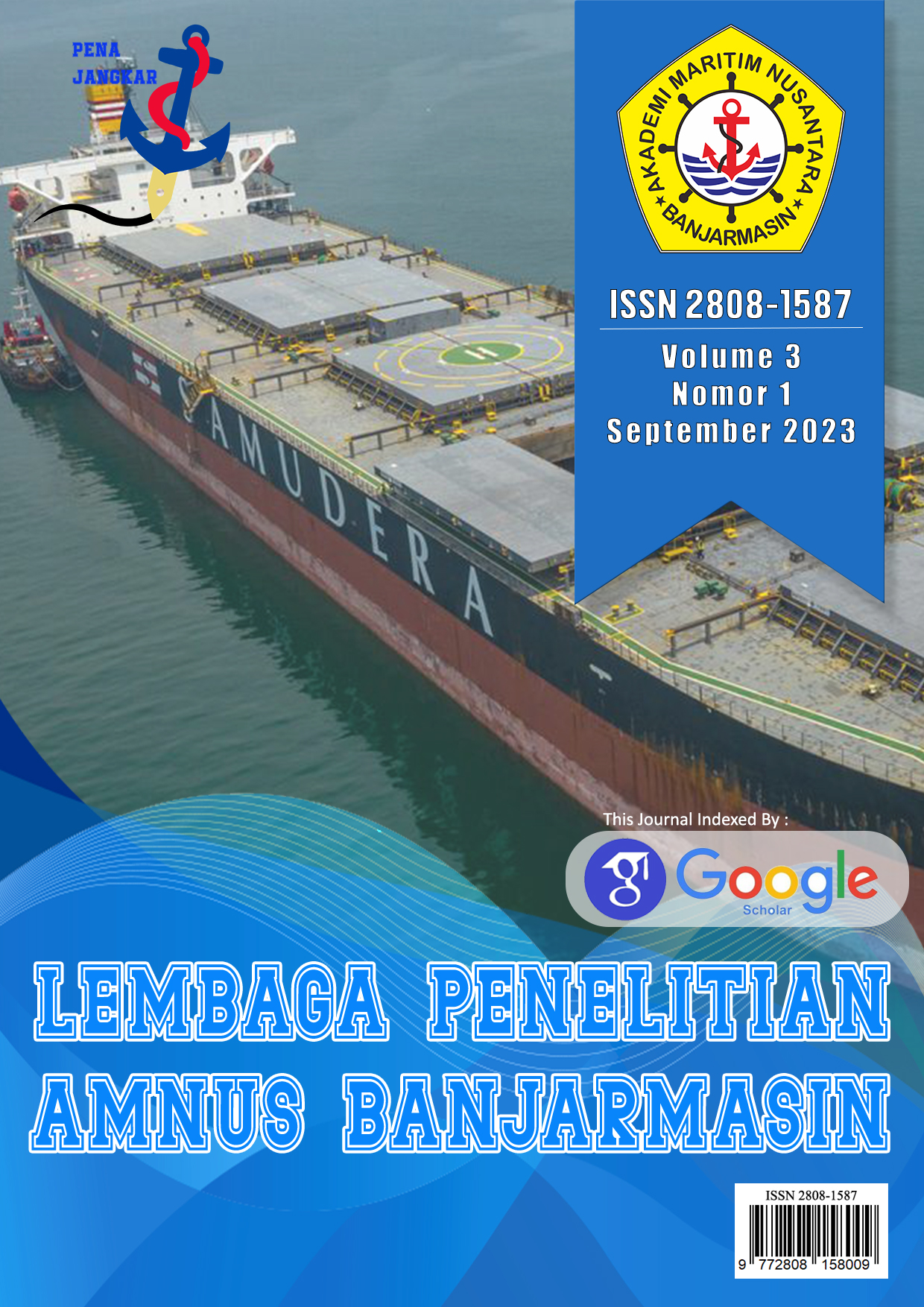AN INVESTIGATION OF THE UTILISATION OF ENGLISH IN THE INTERNSHIP PROGRAMS AMONG THE CADETS OF NUSANTARA MARITIME ACADEMY
DOI:
https://doi.org/10.54315/penajangkar.v3i1.63Keywords:
English for Specific Purposes, Cadets, Internship, Seafarer, Maritime, CareerAbstract
This study aims to examine the utilisation of the English language within the context of the internship programme for maritime cadets, utilising interviews and observations as primary data collection methods. This qualitative research endeavour seeks to offer valuable insights into the role of English language in the internship program for maritime professionals. The findings of this study have made significant contributions to the improvement of language training programmes, communication protocols, and overall safety and efficiency in maritime internship settings. The empirical evidence indicates that possessing a strong command of English is essential for successfully carrying out safety drills, ensuring smooth vessel navigation and engine maintenance, fostering intercultural comprehension and efficient collaboration, and overseeing documentation procedures in port operations. The study places significant emphasis on the necessity of efficient language instruction, the resolution of language-related obstacles, and the facilitation of intercultural dialogue in order to adequately equip maritime academies and internship programs for fruitful internships and prospective careers as skilled and capable seafarers.
References
Acejo, I. (2021). The experience of being a Filipino seafarer on a multinationally crewed ship. The World of the Seafarer, 99-111. https://doi.org/10.1007/978-3- 030-49825-2_9#DOI
Ahmmed, R. (2021). A framework for Maritime English language planning in Bangladeshi maritime education and training institutes. SN Social Sciences, 1(7), 168. https://doi.org/10.1007/s43545-021-00188-5
Alam, M. K. (2021). A systematic qualitative case study: questions, data collection, NVivo analysis and saturation. Qualitative Research in Organizations and Management: An International Journal, 16(1), 1-31.
Arifin, S. R. M. (2018). Ethical considerations in qualitative study. International journal of care scholars, 1(2), 30-33. https://doi.org/10.31436/ijcs.v1i2.82
Birt, L., Scott, S., Cavers, D., Campbell, C., & Walter, F. (2016). Member checking: a tool to enhance trustworthiness or merely a nod to validation?. Qualitative health research, 26(13), 1802-1811. https://doi.org/10.1177/1049732316654870
Casareale, C., Marincioni, F., & Kendra, J. (2021). Smoothing the corners of hierarchy: Integrating shared leadership to mitigate maritime disasters. International Journal of Disaster Risk Reduction, 64, 102471.
https://doi.org/10.1016/j.ijdrr.2021.102471
Chuah, L. F., Mohd Salleh, N. H., Osnin, N. A., Alcaide, J. I., Abdul Majid, M. H.,
Abdullah, A. A., & Klemeš, J. J. (2021). Profiling Malaysian ship registration and seafarers for streamlining future Malaysian shipping governance. Australian Journal of Maritime & Ocean Affairs, 13(4), 225-261.
Dawicki, A. M. (2020). Understanding Graduates' Experiences with a Simulator-Based Ship Handling Course Series. Northeastern University.
Guest, G., MacQueen, K. M., & Namey, E. E. (2011). Applied thematic analysis. sage publications.
Herdawan, D., Nindita, K., & Setyoningrum, A. A. D. (2021). ESP: A Needs Analysis of Maritime English at Polimarin. English Education: Jurnal Tadris Bahasa Inggris, 14(2), 366-387.
Hetherington, C., Flin, R., & Mearns, K. (2006). Safety in shipping: The human element. Journal of safety research, 37(4), 401-411.
https://doi.org/10.1016/j.jsr.2006.04.007
Hussein, K., & Song, D. W. (2022). Maritime logistics for the next decade: Challenges, opportunities and required skills. Global Logistics and Supply Chain Strategies for the 2020s: Vital Skills for the Next Generation, 151-174.
https://doi.org/10.1007/978-3-030-95764-3_9
Jeevan, J., Othman, M. R., Mohd Salleh, N. H., Abu Bakar, A., Osnin, N. A., Selvaduray, M., & Boonadir, N. (2022). Interpretations of Maritime Experts on the Sustainability of Maritime Education: Reducing the Lacuna of
Amalgamation Between Maritime Education and Industries. In Design in Maritime Engineering: Contributions from the ICMAT 2021 (pp. 339-357). Cham: Springer International Publishing.
Jo, S., D’agostini, E., & Kang, J. (2020). From seafarers to E-farers: Maritime cadets’ perceptions towards seafaring jobs in the industry 4.0. Sustainability, 12(19), 8077. https://doi.org/10.3390/su12198077
Kunieda, Y., Murai, K., Kashima, H., & Sugawara, M. (2019). Study on effective maritime training through the anchoring training. TransNav: International Journal on Marine Navigation and Safety of Sea Transportation, 13(2), 381-386. https://doi.org/ 10.12716/1001.13.02.15
Magsino, R. G., Paraggua, V. Q., Mobo, F. D., Acuavera, R. C., Villavicencio, L. D., Pasa, G. C., & Guiang, S. L. A. (2023). Students’ Onboard Experiences: Basis for Improved Shipboard Training Program Policy. International Journal of English Literature and Social Sciences (IJELS), 8(2). Retrieved from https://journal- repository.theshillonga.com/index.php/ijels/article/view/6247
Mirchandani, K., & Bhutani, A. (2023). Disparity learning during youth internships in Singapore. Journal of Vocational Education & Training, 75(1), 87-108. https://doi.org/10.1080/13636820.2022.2123383
Rahayuningsih, M. (2020). Polimarin Alumni's English Proficiency in Maritime Industry Competitiveness in Indonesia. International Journal of Innovation, Creativity and Change. www. ijicc. net, 14(12). 1007-1030.
Sari, L. I., & Sari, R. H. (2020). Exploring English Language Needs of Indonesian Marine Pilots: A Need Analysis and Its Implications in ESP Classrooms. TransNav: International Journal on Marine Navigation & Safety of Sea Transportation, 14(4). 909-914. https://doi.org/10.12716/1001.14.04.15
Tang, L., & Zhang, P. (2021). Human resource management in shipping: Issues, challenges, and solutions. Routledge.
Ting, S. H., Marzuki, E., Chuah, K. M., Misieng, J., & Jerome, C. (2017). Employers’ views on the importance of English proficiency and communication skill for employability in Malaysia. Indonesian Journal of Applied Linguistics, 7(2), 315-
http://dx.doi.org/10.17509/ijal.v7i2.8132
Volkova, A. (2021). Making Sense of Simulators in Teaching Maritime English. Актуальнi питання гуманiтарних наук, 42, 34-39.
Yildirim, U., Şükür, F., & İnegöl, G. M. (2022). Quality Criteria In Maritime Education And Training. Dokuz Eylül Üniversitesi Denizcilik Fakültesi Dergisi, 14(2), 236-263. https://doi.org/10.18613/deudfd.1058625
Yin, R. K. (2015). Qualitative research from start to finish. Guilford publications.
Downloads
Published
How to Cite
Issue
Section
License
Copyright (c) 2023 Pena Jangkar

This work is licensed under a Creative Commons Attribution-ShareAlike 4.0 International License.













